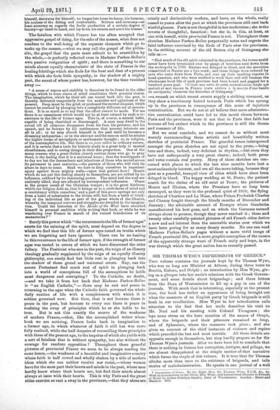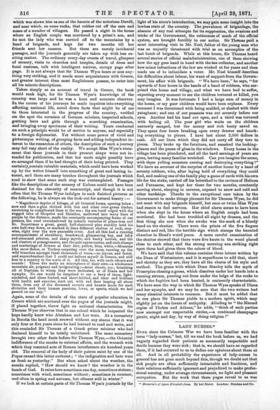SIR THOMAS WYSE'S IMPRESSIONS OF GREECE.* Trio volume contains the
journals kept by Sir Thomas Wyse, who was so long our Minister at Athens, during three tours to Bosotia, Eubces, and Delphi ; an introduction by Miss Wyse, giv- ing us a glimpse into her uncle's relations with the Greek Govern- ment, and some details about brigandage ; and three letters from the Dean of Westminster to fill up a gap in one of the journals. With much that is interesting, especially at the present. time, the book has rather an appearance of being brought out when the massacre of an English party by Greek brigands is stilt fresh in our recollection. Miss Wyse in her introduction calls attention to the fact that her uncle describes his visit to Mr. Noel and his meeting with Colonel Theagenes ; she lays some stress on the bare mention of the names of Oropb,. where the brigands and their prisoners remained so long, and of Sykaminb, where the massacre took place ; and she- gives an account of the chief instances of violence and rapine. which preceded the last and most terrible. All these details are apposite enough in themselves, but they hardly prepare us for Sir Thomas Wyse's journals. After we have been led to conclude that. there is nothing in Greece but corruption, intrigue, and pillage, we are almost disappointed at the simple matter-of-fact narrative which forms the staple of this volume. It is true that Sir Thomas alludes more than once to the existence of brigands, and tells stories of maladministration. He speaks in one journal of a well
* Impressions of Greece. By the Bight Hon. Sir Thomas Wysa, LOX., Sc. With an Introduction by his Niece, Mies Wyse ; and Letters from Greece, to Friends. at Home by Arthur reurhyn Stanley, Doan of Westminster. London : Hurst and Blackett. 1871.
which was shown him as one of the haunts of the notorious Day41i, and near which, on some rocks, that robber cut off the ears and noses of a number of villagers. He passed a night in the house where an English couple was murdered by a priest's son, and he met the lady who was carried off to the mountains by a band of brigands, and kept for two months till her friends sent her ransom. But these are merely incidental passages, and the journals generally are taken up with less ex- citing matter. The ordinary every-day events of travel, glimpses of scenery, visits to churches and temples, details of dress and local customs, talk with intelligent natives, occupy page after page. It is not always that Sir Thomas Wyse hears or sees any- thing very striking, and it needs more acquaintance with Greece, and greater interest than most Englishmen possess, to enter into all his minute descriptions.
Taken simply as an account of travel in Greece, the book would rank high, for Sir Thomas Wyse's knowledge of the country was large and he was a keen and accurate observer. In the course of his journeys he made inquiries into everything affecting national life, noted down facts that might be of use to those interested in the progress of the country, verified on the spot the surmises of German scholars, inspected schools, putting boys and girls through a searching examination, and bringing away specimens of their writing. Tours conducted on such a principle would be of service to anyone, and especially to a foreign diplomatist. Yet without some power of vivid and picturesque writing, of grouping facts and adding independent in- terest to the researches of others, the description of such a journey allay fall very short of the reality. We accept Miss Wyse's state- ment that these journals in their present shape were not in- tended for publication, and that her uncle might possibly have re-arranged them if he had thought of their being printed. They certainly.contain valuable materials, which could have been worked sip by the writer himself into something of great and lasting in- terest, and there are many touches throughout the journals which tend to show that some such step was contemplated. Passages like the descriptions of the scenery of Eubcea could not have been destined for the obscurity of manuscript, and though it is not .often that Sir Thomas Wyse indulges in such finished pictures as he following, he is always on the look-out for natural beauty :— " Magnificent depths of foliage, of all Oriental forms, opening below ; atow and then a glen clothed with ilex and other ever-green timber, stretching in complicated lines to the sea ; the sea itself edged with the rugged isles of Skopelos and Skiathos, mellowed into wavy lines of purple by the distance, made the constantly accompanying frame of our picture, the road overshadowed by infinite varieties of plane-tree and fir. Sometimes a great, gaunt, half-shattered pine sturdily held his own half-way down, or marked in lines different shelves of rock, step- wise, right over the now peaceable river. And all this had a running accompaniment of shrubbery, brushwood, glimmering bay, and lofty red-stemmed arbutus, and sharp myrtle, and bushy lentisk, and the red clusters of pomegranates, and the pale agnus-castus, and such clumps and scatterings of flowers at their feet, yellow, blue, white,—blossoms like snow-flakes, or Turkey-carpetimg over the moss, running up the wild branches amongst those thousands of trees,—so joyous, and festal, and superabundant that I could not believe myself in Greece, and still less in a country to the north of it. All this, too, with such odours and sounds ! These firs make an atmosphere of their own—a wholesome mountain air, poignant and invigorating ;—most classic, too ; breathing all of Neptune, to whom they were dedicated, or of Diana and her nymphs. No one would be surprised to see a bevy of them, light- sandalled, and clean-limbed, and short-kirtled, and clear and brilliant with health and exercise, start out, with red deer leaping all about them, from any of the thousand coverts and haunts made for sueh divinities and their human passions, loves, or sports, which we had passed on our way."
Again, some of the details of the state of popular education in Greece which are scattered over the pages of the journals might, if placed together, throw light on national characteristics. Sir Thomas Wyse observes that in one school which he inspected the boys hardly knew who Abraham and Lot were. At a monastery in Bceotia the head monk avowed without any shame that it was only four or five years since he had learned to read and write, and this reminded Sir Thomas of a Greek prime minister who had declared himself to be totally unlettered. The same monastery brought two other facts before Sir Thomas Wyse,—the Oriental indifference of the monks to external affairs, and the warmth with which they resented acts of Roman interference six hundred years old. The removal of the body of their patron saint by one of the Popes caused this latter outburst ; "the indignation and hate were as fresh as yesterday." But when asked about the weather, the monks replied, "I-low should we know? the weather is in the hands of God. It rains here sometimes one day, sometimes sixteen ; sometimes with wind, sometimes without ; sometimes in summer, and often in spring and autumn, but oftener still in winter."
If we look at certain parts of Sir Thomas Wyse's journals by the
light of his niece's introduction, we may gain some insight into the lawless state of the country. The prevalence of brigandage, the absence of any real attempts for its suppression, the evasions and tricks of the Government, the rottenness of much of the official system, are brought forcibly to our notice. Sir Thomas paid a most interesting visit to Mr. Noel, father of the young man who was so unjustly threatened with trial as an accomplice of the last batch of brigands. While at this house, Sir Thomas heard several stories of official maladministration, one of them showing how the spy goes hand in hand with the tax-collector, and another how minor infractions of the law are winked at for years and then made use of to intimidate a voter. Mr. Noel himself describes his difficulties about labour, his want of support from the Govern- ment, his affair with brigands. "We have been," he says, "for upwards of four hours in the hands of a band of robbers, who sur- prised this house and village, and what we have had to suffer, expecting every moment to see the children tortured or killed, you may imagine. It was fortunate I had a large sum of money in the house, or my poor children would have been orphans. Every moment I was threatened with being scalded, or slashed with their yataghans ; and one of our peasants was cut severely before our eyes. Another had his head cut open, and a third was tortured with boiling oil. The poor girl who waits on the children narrowly escaped, but the money and rich booty saved us. They spent four hours breaking open every drawer and knock- ing everything to pieces. I have lost about 2,000 dollars in cash. All our linen which they did not carry off they tore to pieces. They broke up the furniture, and smashed the looking- glasses and the panes of glass in the windows. Every house in the village has been plundered, and all the hard earnings of years are gone, leaving many families wretched. Can you imagine the scene, with these yelling monsters cursing and destroying everything ?" We have an account of the surprise of another house by a band of seventy robbers, who, after laying hold of everything they could find, and making one of the family play a game of cards with his own life for the stake, carried off his betrothed to the ravines of Helicon and Parnassus, and kept her there for two months, constantly moving about, sleeping in caverns, exposed to snow and cold and other hardships. Thanks to the exceptional care taken by the Government to make things pleasant for Sir Thomas Wyse, he did not meet with any brigands himself, but once or twice Miss Wyse had reason to feel nervous. Her chief alarm seems to have been when she slept in the house where an English couple had been murdered. She had been troubled all night by dreams, and the first thing she saw when she awoke was the mark of a bloody hand on the shutter. There were the prints of the five fingers distinct and red, like the terrible sign which stamps the haunted chamber in Hood's weird poem. A more careful examination of the shutter showed that there were five knots in the wood placed close to each other, and the strong morning sun striking right upon them had given them the colour of blood.
We have said that this volume contains three letters written by the Dean of NVestminster, and it is superfluous to add that, short and sketchy as they are, they have all the charm of his style and method. The grace with which Dean Stanley tells the myth of Proserpine chasing a goose, which dissolves under her hands into a running stream, pouring out from under the ledge of the rocks to which the fugitive had been hunted, is eminently characteristic. We have seen the way in which Sir Thomas Wyse speaks of Diana and her nymphs, and we may be sure that the two writers had many classical interests in common. But it must be added that in one place Sir Thomas yields to a modern spirit, which may slightly jar on the lovers of antiquity. Alluding to "the Monad orgies of Thebes and Athens," he adds, "think of such parties now amongst our respectable circles,—a continued champagne picnic, night and day, by way of doing religion !"



































 Previous page
Previous page